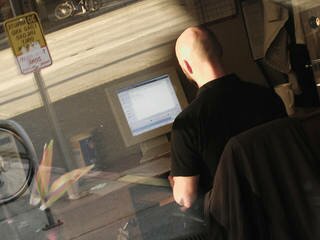"Tourist," a view from the Columbia Tower, courtesy of The SunBreak Flickr pool's slightlynorth.
It was a week featuring two of Seattle's most prominent architectural icons: on the tenth anniversary of the Kingdome implosion, the market for commercial space downtown has imploded, too. Beacon Capital Partners missed a loan payment on the Columbia Tower, and faces a 33 percent vacancy rate once Amazon decamps next year. Starbucks announced ten-cent-per-share dividends at its annual meeting. One of our hippos died.
Plans for a private Chihuly exhibit at Seattle Center ran smack into Seattle process; now the Center will open up public bidding for use of the space vacated by the Fun Forest. Seattlepi.com reports that "Beth Campbell filed a motion in U.S. District Court asking that construction of the southern mile of a viaduct-replacement project be delayed until a full environmental-impact study is done of the entire viaduct project."
The city council joined every other Washington Democrat in wishing AG Rob McKenna would not challenge the constitutionality of the federal health care reform bill. Seattle's direct care providers Qliance are looking forward to the new insurance exchanges. Seattle was named the top city for cybercrime in America.
Mayor McGinn claims he has an affordable West Seattle-Ballard light rail line up his sleeve. Amtrak passengers had to take the long way around when a mudslide hit the tracks near Mukilteo--for the second time in two weeks. Mudslides aside, we now have extra Amtrak to Vancouver, B.C., through September. Nick Licata wants to lean on the U.S. Army Corps of Engineers for help with the seawall replacement....
 Sure you have a firewall, but what about people photographing you through the window? Thanks to Flickr pool member mangpages!
Sure you have a firewall, but what about people photographing you through the window? Thanks to Flickr pool member mangpages!
It's like the Los Angeles Times only cares about Seattle if we're jumping off bridges or exposing ourselves to cybercrime. The story now is one of those virally successful PR efforts, based on computer crime busters Symantec rating 50 U.S. cities "using 24-million security sensors that monitor malicious-attack activity around the globe."
They counted up PC attacks, viruses and worms, and bot-infected computers used to send spam or transmit malware, checked the frequency of the attacks, and weighed behavior like connecting to public Wi-Fi shopping online without a secure connection.
Says Symantec, Seattle is top of the charts on almost every risk factor. But let's take this with a grain of salt. I asked Mark Rushing, systems analyst and open-source pusher at Orbis Lumen, for his take. Mark would have wanted to confirm that we're talking about actually illegal acts, rather than the sexy, all-purpose "cybercrime," and to know more about the role of false positives in "attacks" reported by virus software. But here are his initial responses.
So, cybercrime mecca Seattle: hooey or not hooey?
Probably a little of both. It's marketing. You're supposed to be scared and buy Norton/Symantec products. I notice that Fox News seems to have taken the largest interest in this story.
Is security even possible any more?
Complete security has never been, and will never be, possible. You can only take precautions. The more precautions you take, the more inconvenient and impractical your experiences can become. And interestingly, the more privacy you seem give up.
What are some basic precautions people just don't "get around to"?
The best protection is increasing your awareness. If you want to be safer, you must be aware of your environment. Learning is the best thing you can do. Alas, people prefer packaged conveniences, it seems, so they buy Norton/Symantec products, or buy AVG products (or use their free one). But this lets them observe all you and your computer is doing.
Better to use an operating system that is based upon best practices in the underlying science and technology, rather than predominantly marketing forces. Your conveniences always come at a cost, and those conveniences are rarely the best (and often not even the simplest) way to do things.
And of course, don't use the same password for every site. Use unique, harder passwords for sites with access to your bank accounts. Don't install software from places you do not know or trust. Etc., etc....

Most Recent Comments